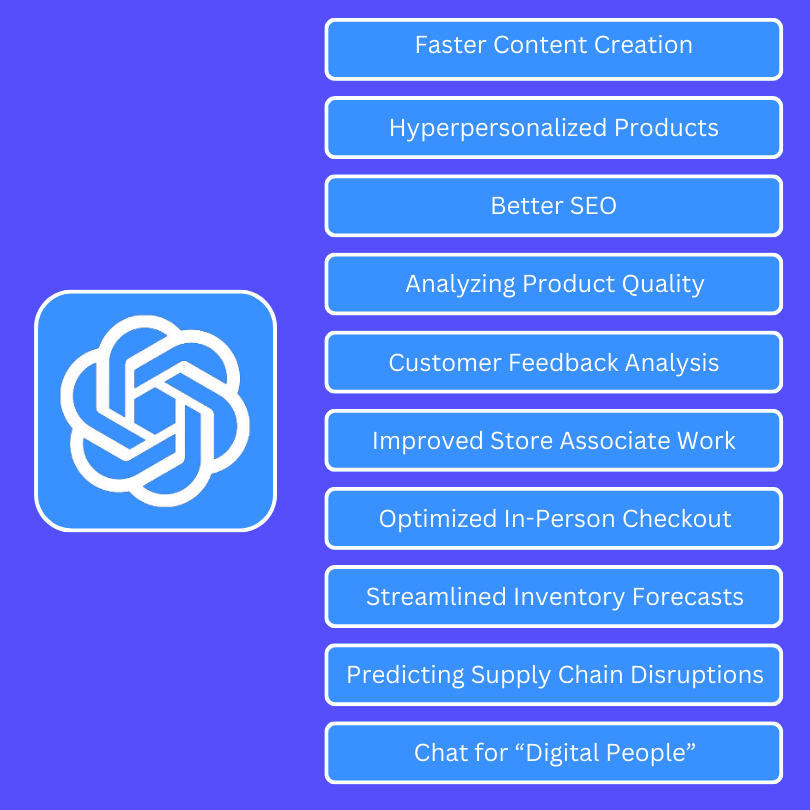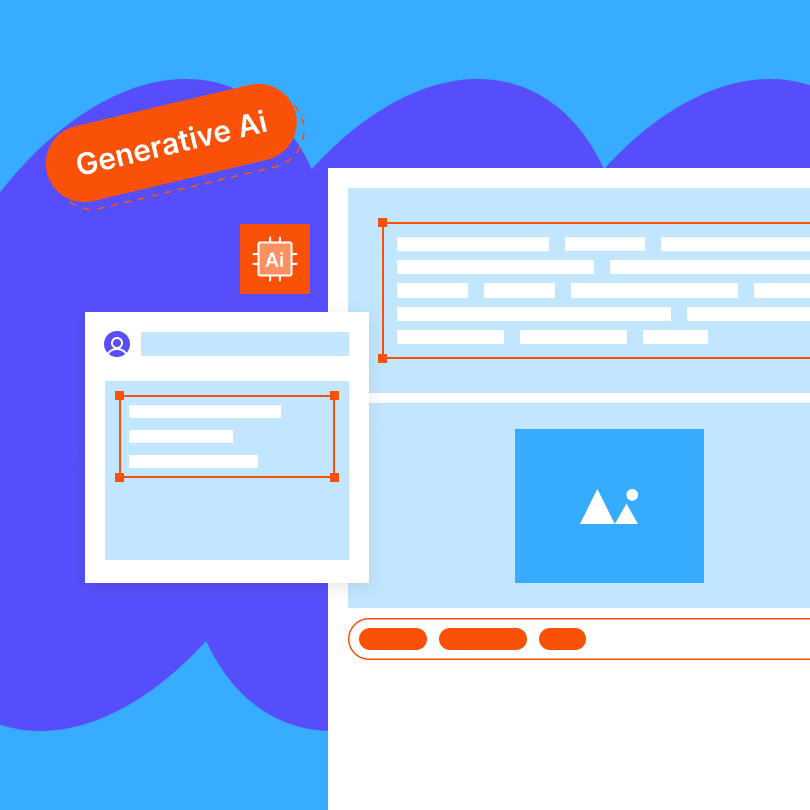Let’s face it: retailers are facing several challenges at the moment. From possible recessions and record-high inflation to increased costs across the entire supply chain, talent retention is also at an all-time low.
Amidst this chaotic time, customer demands are evolving faster than ever. During this turbulent period, retailers need to create effective workflows while keeping buyer experiences first-class. And what would be the true game-changer to make all that happen? You’ve guessed right: using generative AI in eCommerce.
Techs like DALL-E and ChatGPT have taken the world of digital marketing by storm, but these AI applications also have their place in eCommerce. Still, how can these tools benefit online retailers to maximize their potential? In this article, we’re talking about the role of generative AI in eCommerce and how AI in B2B commerce can be a true game-changer.
About Generative AI
In simple words, these systems can generate images, text, and other content types by responding to user-given prompts. In practice, generative AI tools and models understand both code and language, rushing in a new era of application web and eCommerce development services. As such, these models and software also enable retailers with new opportunities to cater to their customers, immersing them in new digital experiences.
Apart from innovation and hyper-individualization, generative AI in eCommerce can also help with the following business areas:
- New levels of consumer engagement: Incorporating AI tools and automated workflows into content and social media eCommerce strategies, retailers can reach out to more people with quality content across different channels and campaigns, ensuring high quality along with a consistent brand presence.
- Store operations, marketing, and design: Using AI in a B2B setting can also improve customer experiences as retailers have more in-depth insight into customer-related data via automated report generation and other summaries. Apart from that, the gathered data can show sticking points in website page design, and the buyer journey, and can pinpoint other consumer troubles and complaints more efficiently.
- Innovative automation: Using AI in eCommerce can help automate several processes, from email marketing campaigns to employee training.
- Back-office management: AI applications in eCommerce may also improve internal communications, like HR and IT helpdesk tickets, or other processes, such as procurement matters.
Generative AI in eCommerce: Leveraging Machine Learning
Tech-savvy retailers have already seen tremendous growth and process optimization from using AI and machine learning in eCommerce. It helps with their social media and eCommerce content strategies, but using AI in B2B commerce goes beyond classic digital marketing tasks.
Below, we bring you ten use cases for using AI applications in eCommerce.

Branding and Product Awareness
- Faster Content Creation
Generative AI can be a tremendous help in creating evergreen brand and marketing content. From buyer’s and product guides to how-to instructions and social media posts, these pieces of content can be published whenever.
- Hyperpersonalized Product Recommendations
AI and machine learning tools in eCommerce can read customer preferences and intent to create product descriptions that simply resonate better with potential buyers at scale. Simply put, it does a better job of catering to everyone’s tastes and experiences without the guesswork and grind.
Commerce Analytics, Administration, and Operations
- Better SEO
AI in a B2B setting can also help you create SEO-friendly product descriptions that can help you support your SEO strategy.
- Analyzing Product Quality
AI and machine learning in eCommerce can also help identify production anomalies, defects, and arrows by analyzing product images. This help can tremendously impact product quality improvement and may also improve the delivery and user experiences.
- At-Scale, Precise Customer Feedback Analysis
AI tools may also search reviews from customers for specific services or products across all channels, marketplaces, and platforms, streamlining and interpreting all the feedback and info, enabling retailers to respond to feedback faster, control their brands better, and improve overall customer satisfaction.
Connecting Offline and Online Experiences
- Improved Store Associate Work
AI in a B2B setting can be set up at literally every endpoint, both online and offline. Store associates can manage, track, and replenish stocks, so brick-and-mortar and online stores can both be more prepared for customers and unexpected situations.
- Optimized In-Person Checkout
Generative AI can also be used to create personalized order summaries at checkout. Such summaries can create more opportunities for cross-selling and up-selling, even further improving revenue flow and customer experience.
Optimizing The Supply Chain
- Streamlined Inventory Forecasts
Inventory management can also be automated by feeding AI tools input on customer preferences and past order histories to forecast future demand better and suggest restocking levels.
- Predicting Supply Chain Disruptions
Generative AI in eCommerce can also give predictive insights. It may also be able to give a proactive forecast on external factors like geopolitics, finance, or even the weather – all those aspects that can positively or negatively impact the processes within the supply chain.
Improving Post-Order Experiences
- Chat for “Digital People”
Leverage ChatGPT to craft content for digital avatars aimed at enhancing customer interactions. Employ technologies such as the Microsoft Whisper API to achieve speech-to-text accuracy comparable to human levels, adding a more lifelike touch to conversations. Utilize conversational commerce features to promptly address inquiries regarding order status and deliver personalized recommendations tailored to each shopper’s preferences.
How To Use AI in eCommerce: The Golden Age of Conversational Commerce
Conversational commerce has been a buzz phrase in the B2B sphere for some time now. In simple words, conversational commerce enhances the shopping experience with different messaging technologies. Help from apps or chat options on websites to help the buyer’s journey with answering questions and offering more personalized products has been a staple in most eCommerce platforms. Still, the introduction of machine learning and generative AI ups the game of these “classic” features.
To be more specific, AI can be integrated into every digital eCommerce experience. This can help create a truly hyper-personalized experience across every channel, always continuing the buyer journey where the shopper left off, regardless of the platform.
The Era of The Online Personal Shopper
For the most part, the buyer journey today is pretty much transient and linear. If you want to buy clothes, you start looking at shirts first, pants second, and lastly, shoes. The problem is that most websites handle these search queries as three separate interactions, and you did not. To overcome this obstacle, some websites have started to implement chatbots that try to stimulate a salesperson.
Needless to say, this leads to a subpar experience because it can come off as very robotic, salesy, and, more often than not, extremely clumsy.
This is where AI in eCommerce can truly change the game. By integrating a sophisticated AI tool on your website, you can keep better track of your shoppers’ preferences and add more context to the entire experience. This means that the same preferences they had for shirts will also be present for shoes, pants, and other accessories as they continue browsing the website.
The Power of Personalized Descriptions
Generative AI further enhances conversational commerce by adapting product descriptions to match each shopper’s preferences in real-time. This dynamic process personalizes the product discovery journey, akin to receiving tailored guidance from an in-store sales associate. For instance, imagine you’re browsing for a bike online. By analyzing your search patterns and location (e.g., Minneapolis, MN), where gravel paths and lakeside routes are prevalent, the website can discern your preference for a comfortable ride suited for rough terrain. Leveraging generative AI, this data is utilized to customize product information and descriptions, ensuring an experience that resonates with your individual needs and interests.
Intelligent Reorders
The best customers are always loyal, recurring customers. If some of your customers regularly purchase the same items once or more times every week, why not elevate their experience with intelligent reorders?
Simple things such as add-to-cart suggestions and automatic shopping lists can make all of these routine shop runs a lot faster and easier, all while creating a more tailored experience.
A New Era In eCommerce
AI in eCommerce is poised to revolutionize the way businesses engage with customers and streamline the online shopping experience. With advancements in generative AI, conversational commerce, and personalization techniques, retailers can expect to offer unparalleled levels of customization and convenience to shoppers. From virtual assistants that provide real-time product recommendations to dynamic pricing algorithms that optimize sales strategies, AI technologies will continue to drive innovation and reshape the landscape of eCommerce. As businesses harness the power of AI to understand consumer behavior better and deliver tailored solutions, the potential for growth and success in the eCommerce sector is limitless.





